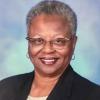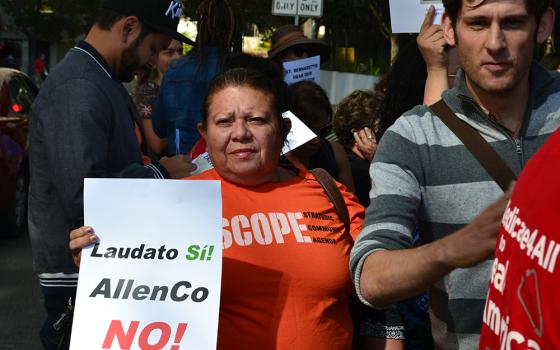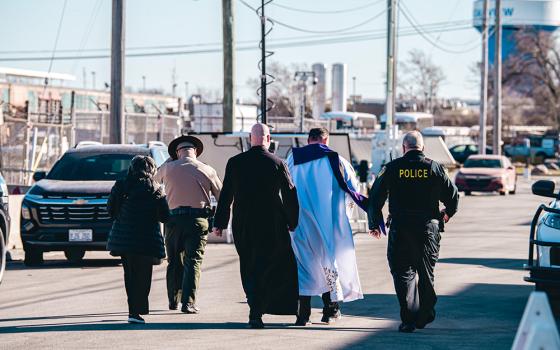The late Sr. Thea Bowman, pictured in an undated photo, gave a speech to the U.S. Conference of Catholic Bishops in 1989 in which she said being Black and Catholic made her feel like "a motherless child." Bowman is a candidate for sainthood. (CNS/Michael Hoyt)
Professor Robin D. G. Kelley, in Freedom Dreams: The Black Radical Imagination, introduces the concept of freedom dreaming — the liberatory power of the imagination. Before we can build a new world, we must first envision it. This is not unfamiliar to our Catholic faith. St. Ignatius of Loyola, in his Spiritual Exercises, encourages us to enter into the Word with our imagination — to see ourselves at the center of Scripture, and to hear Christ speak to us directly. Imagination, then, can be a sacred, transformative practice that deepens our understanding of God's promises, enabling our people to make a way out of no way.
Martin Luther King Jr. echoed this tradition in his "I Have a Dream" speech, in which he imagined a world where we would all be together and his children could play together with children from different cultures. He dared to dream of a country that honored its founding creed: that all are created equal.
Five years later, in 1968, King was assassinated. And in that very same year, our beloved community — the National Black Sisters Conference, or NBSC — was born. Black vowed religious women, many from predominantly white orders, came together in righteous indignation and sacred resolve. We dreamt of doing more, being more fully present to our communities, and confronting the racism that existed in the world and in the church.
Our dreams led to action: We taught, we served, we ministered, and we loved fiercely and faithfully. We believed, as we still do, that Catholic social teaching must extend to all people, in all pews, in every parish.
We dream of archdioceses and dioceses that see anti-racism not as an add-on, but as fundamentally Catholic.
Recently, FADICA - Catholic Philanthropy Network released a report titled "And the Walls Came Tumbling Down: A Report on U.S. Black Catholic Dreams Toward a Just Church." In it, freedom dreaming is not just referenced — it is central to the narrative. Researchers asked Black Catholics to imagine: "What is your dream for an equitable, anti-racist church?"
The responses shaped 10 recommendations that we at NBSC wholeheartedly affirm. These dreams are not theoretical — they are reflections of work we have long embodied. But the path from vision to transformation requires more than affirmation. It requires investment.
For over 50 years, NBSC has not only dreamed of a just church — we have labored to build it.
We are a community of Black religious women working for justice in the 21st century. We have created programs that mentor new leaders, nurture lay vocations, support trauma-informed ministries and empower Black Catholic youth for a global church. We've served on the frontlines of both ecclesial and civic engagement, resisting racism while modeling the fullness of what it means to be Catholic.
NBSC joins FADICA in raising the dreams for an equitable church and encouraging philanthropists, bishops and fellow leaders to invest in the people and organizations building an anti-racist future. The targeted financial support of generous donors, as recommended in the FADICA report, would be a catalyst, not only for NBSC but for Black Catholic ministries across the country.
Our freedom dreams remain bold. What would an anti-racist, equitable church look like? The first letter to the Corinthians (10:17) offers a vision: "Because there is one loaf, we, who are many, are one body, for we all share the one loaf."
Advertisement
We dream of a church that reflects this eucharistic unity — a body made whole through its diversity. We dream of archdioceses and dioceses that see anti-racism not as an add-on, but as fundamentally Catholic. A church where equity shapes budgets, policies and programs. A church where Christ's radical love goes beyond church walls and is embodied in schools, hospitals and communities of care.
As Servant of God Sr. Thea Bowman encouraged in her address to the U.S. Conference of Catholic Bishops in 1989, the church must be a prophetic voice — a real witness to the power of God in its love and concern for all its members, accepting her and her people as "fully Black and fully Catholic."
Many, many Catholics dream of that church. But most Catholics do not know that there are excellent recommendations in this report by FADICA and that there are many organizations like NBSC working every day to make a just church a reality.








